Running a small business nowadays isn’t just about product and customer service. It also requires smart technology to fasten sales and operations. One of the most important tools in this is the Point-of-Sale (POS) system. From managing transactions to tracking inventory, nowadays, POS systems are not just simple cash registers. In this blog, we will explore the top 15 best POS system for small businesses in 2025, which will help you grow.
What is a POS System?
A Point-of-Sale (POS) system is the technology on which businesses operate to close sales. Historically, it was merely the cash register; however, there has been a massive enhancement in the POS systems in 2025. They integrate hardware (such as card readers, barcode scanners, tablets, and receipt printers) with sales, inventory and customer data management and reporting software.
In non-technical terms, every time a customer makes a purchase, whether in-store, online, or via a cell phone app, a POS system is the one that collects the payment and records the purchase.
The current POS systems are aimed at facilitating the activity of business in the following ways:
- Processing various forms of payment(credit/debit cards, UPI, digital wallet, contactless payments).
- Automatic tracking of inventory as sales occur.
- Role-based access to personnel and performance-tracking.
- Producing elaborate reports to provide the owners of the business with the information on sales trends and profitability.
To put it concisely, a POS system does not simply deal with taking payments; it is the small business nerve centre in the modern age.
Types of POS Systems
There are various types of POS systems. Different business needs have different needs, which is why there are various types of POS Systems:
Traditional POS (On-Premise POS)
Traditional POS systems, which reside on local servers and are connected to such hardware as registers and scanners, are reliable, yet need a lot of maintenance. They apply most effectively to place-sensitive establishments such as retail stores and testaurants.
Cloud-Based POS
The data in cloud POS can be accessed anywhere since it is stored on the Internet. It is so popular among the small businesses of 2025 because of the ease of updates and integrations, flexibility, and scalability that are required by most small companies.
Mobile POS (mPOS)
mPOS is a card reader with an easy application to a smartphone or tablet. Very cheap and mobile is ideal when it comes to food truck stops and small-scale vendors who must get an opportunity to take payment in the field.
Multichannel / eCommerce POS
The system unites the in-store and online sales and will keep the inventory and customer information in sync. It is best suited to companies that retail in physical stores, online, and market-based shops.
Self-Service POS / Kiosk POS
Kiosk POS is available in cafes, fast-food restaurants and gas stations; customers can make orders and provide payment at the kiosk. It enables a shorter waiting time, but it often needs a greater initial investment.
Open-Source POS
Open-source POS allows businesses to fully customise their software. While flexible, it demands technical know-how and is best for companies with IT support and unique needs.
Why Your Small Business Needs a POS System
Streamlined Transactions
With a POS, people can make purchases fast and conveniently since no additional effort is required in using various choices of payment cards, UPI, wallets, and contactless payment.
Better Inventory Management
POS systems auto-adjust stock, so that instead of manually managing inventory, every sale will provide this update to prevent shortages or overstocking.
Improved Customer Experience
POS systems support customer attraction and retention through such features as loyalty programs, personal offers, faster checkouts, etc.
Employee and Sales Tracking
POS systems would enable business owners to keep checking on the performance of the staff members, sales patterns and the busiest hours so that they can make smarter decisions.
Data and Insights
The in-depth analytics provides reporting on sales, profits, and customer behaviour and allows small business owners to learn the insights they require to expand strategically.
Key Features to Look for in a POS System
Ease of Use
A POS system must be easy to install and use, allowing the owners and employees to navigate through the system with minimal training. This feature of an intuitive interface saves time and eliminates some of the possible errors during rush hours.
Multiple Payment Options
The POS must be card-based, UPI, payment using digital wallets, and even contactless to provide customers with checkout flexibility. It further enhances customer convenience and satisfaction through the provision of increased payment options.
Inventory Management
The automated stock tracking will make sure that you can always see what is selling, what is low and when to reorder. This reduces stockouts and overstocking, hence cash flow and inventory can be balanced.
Sales Reporting & Analytics
Smart business decisions can be made with detailed information regarding the sales trends and favourite products, and customer preferences. Real-time data allows the owners to work within the market demand.
Integration Capabilities
The most excellent POS systems integrate with accounting systems, eCommerce and CRM software to make operations seamless. Integrations minimise manual labour and make all the functions of the business in line with one another.
Scalability
The POS system in use should have the capability of supporting more products, more customers, and more sales channels as your business expands. A scalable system will prevent you not to outgrowing your POS too soon.
Best POS System for Small Businesses in 2025
1. Square
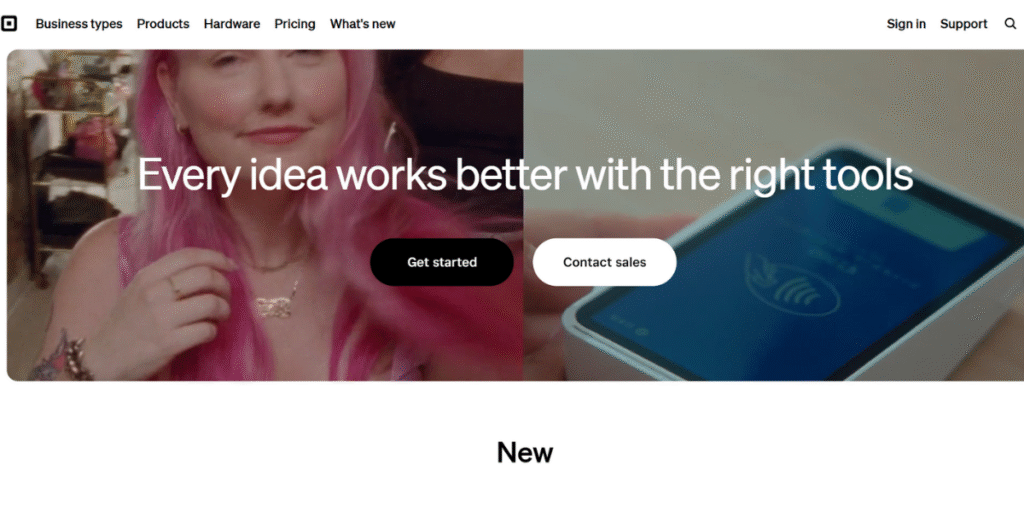
Square is a very popular POS system in small companies because of its simplicity, the free replication of the program and a straightforward installation. It enables entrepreneurs to track sales, inventory and customer data using only a mobile device or a tablet, so there is no heavy equipment around. Square also ties in other tools, i.e., payroll, marketing, and invoicing, thus going beyond being merely a processor of payments. It is also an attractive option to small businesses because of the inexpensive hardware and payment structure.
Pros:
- Good handling of inventory and supplier.
- Supports multi-location stores and is suited to chains.
- High-End analytics and reporting capabilities.
- Integrated eCommerce.
Cons:
- Greater costing than basic POS systems.
- Newcomers can find dashboard daunting.
Pricing: Free plan available; transaction fees apply.
Ideal business type: Best suited for small businesses, food trucks, and retail startups.
Website: https://squareup.com/
2. Shopify POS
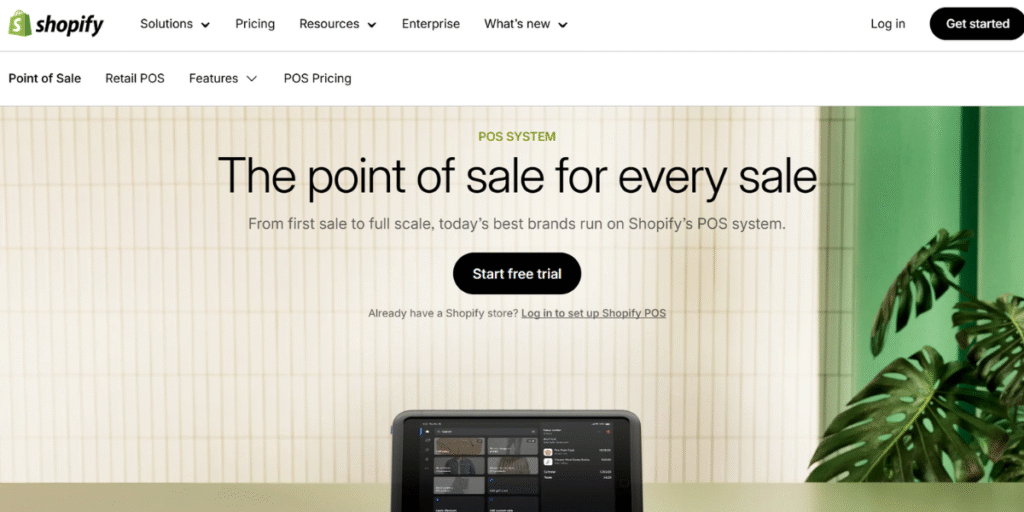
Shopify POS is tailored to retailers that operate in stationary and online stores, and is integrable with the Shopify eCommerce platform. It offers channel synchronisation in time in inventory so as to prevent oversales to the company. Shopify POS also has a customer profiles feature, discounts and loyalty programs that provide customer relationship building features. It is scalable and dependable, a, nd can work with small boutiques as well as multi-store retailers in search of a cohesive approach.
Pros:
- Great inventory and CRM.
- Offline cloud-based.
- Cheaper than high-end POS systems.
- Enables multi-location.
Cons:
- Interface appears obsolete about new-fangled tools.
- Only computer skills to custom make it.
Pricing: Starts at $39/month with transaction fees.
Ideal business type: Ideal for retail stores, boutiques, and eCommerce-focused businesses.
Website: https://www.shopify.com/in/pos
3. Toast
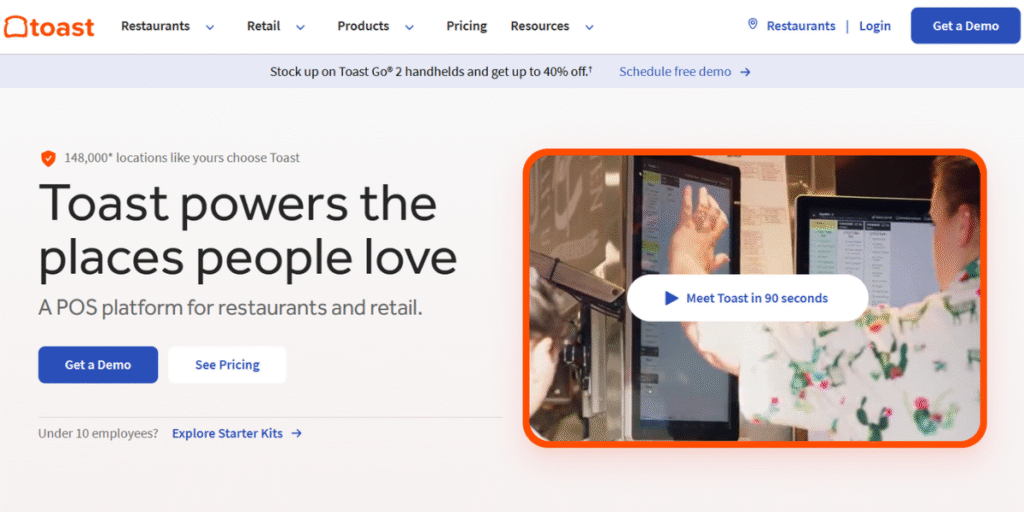
Toast is a restaurant-centric POS system that streamlines fast-paced restaurant operations. It provides order at the table, menu and kitchen display systems, and online ordering, all avenues based on a single platform. This system enhances efficiency since it allows the staff to take orders on handheld devices, after which they are transmitted directly to the kitchen. Toast offers delivery integrations, reporting, self-service kiosks, and other customer-friendly services, and it provides restaurants, cafes, and bars with all of the solutions they need.
Pros:
- Polished, contemporary, and configurable hardware.
- Broad app store to increase capabilities.
- Simple and simple to install.
- Covering payments, employees and customer management.
Cons:
- Incapacitated in Clover’s proprietary hardware.
- Add-ons add to costs rapidly.
Pricing: Plans start at $69/month.
Ideal business type: best for restaurants, cafes, and bars.
Website: https://pos.toasttab.com/
4. Lightspeed Retail
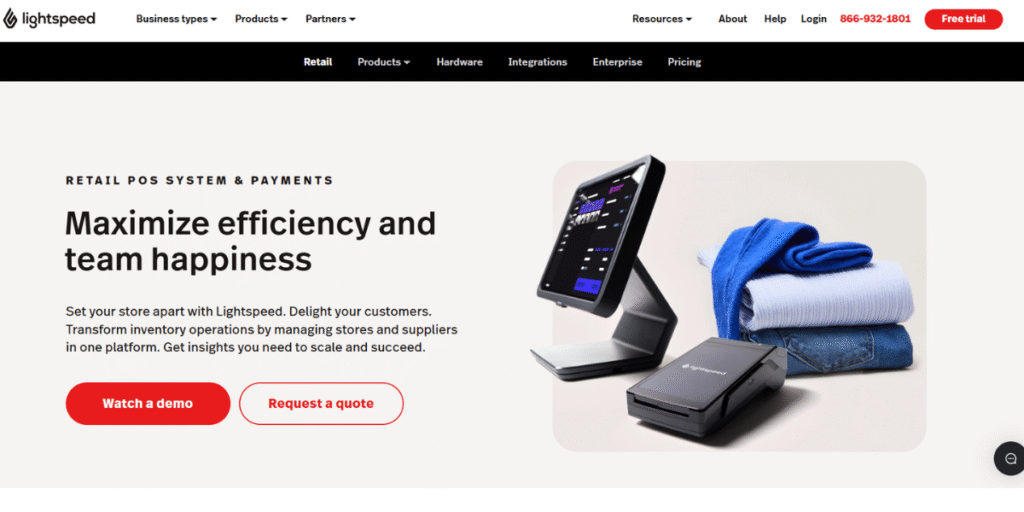
It is a cloud-based point of sale (POS) solution that is targeted at growing retailers who require sophisticated inventory, reporting and multi-store management. It can support the variations in a product, ordering of purchases and supplier management, which is why it is good in stores that have complex inventories. It also has features of being able to integrate with eCommerce platforms, accounting tools, and loyalty programs, which makes the system a full-service retail solution.
Pros:
- Very flexible and customisable.
- This is perfect in retail and in restaurants.
- Good analytical and human resource handling.
- Chains’ multi-location support.
Cons:
- Small businesses may not be suitable with high pricing.
- Steep learning curve to learn.
Pricing: Plans start at $69/month.
Ideal business type: Ideal for retail stores, apparel shops, and multi-location businesses.
Website: https://www.lightspeedhq.com/pos/retail/
5. Erply
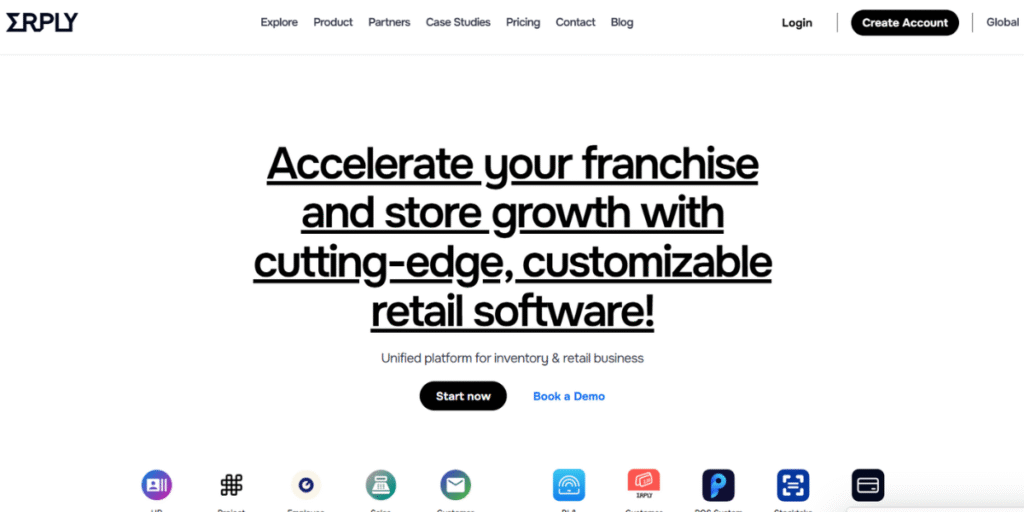
Erply is a flexible point of sale system with powerful inventory capabilities and a wide range of compatibility across varied business types. It provides cloud-connectivity, customisation, and robust back-office capabilities (customer management, offers, and reporting). Erply has been known to be used by large inventory- or multi-location retailers who need to filter their inventory easily. Its cost is affordable to the small to mid-sized company.
Pros:
- Very stable and secureenterprise-levell solution.
- Hospitality and retail advanced features.
- Good international and integrations.
- Extremely versatile to fit big businesses.
Cons:
- Quite costly for a small business.
- Involved installation that needs technical assistance
Pricing: Plans start at $39/month.
Ideal business type: Best for retail, convenience stores, and franchises.
Website: https://epos.erply.com/latest/
6. Clover
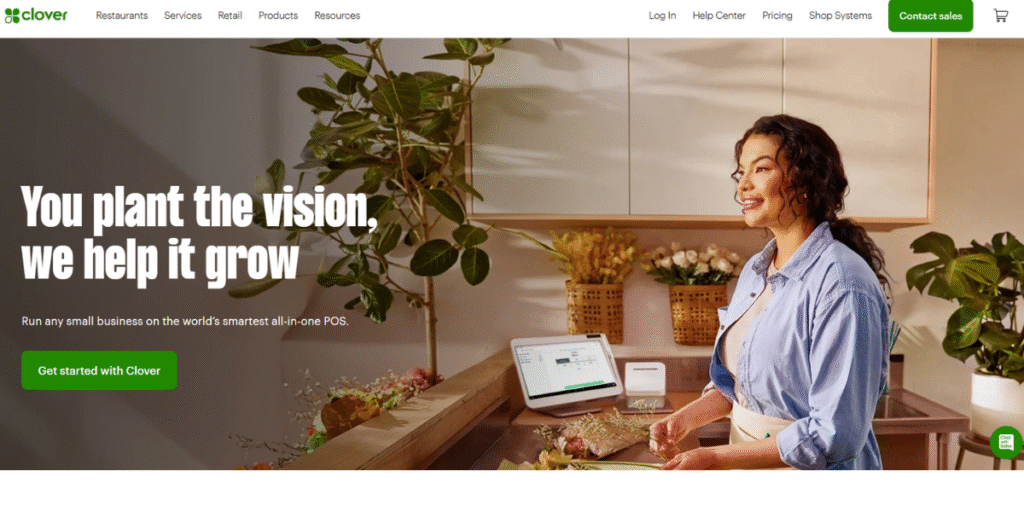
Clover offers a one-stop POS system that is customizable both in hardware and software to enable it to suit a variety of industries. It offers sleek machines such as countertop stations, as well as handheld readers that are accompanied by an app marketplace, which allows businesses to add functionality as it suits their requirements. Clover excels especially in working with employees, customer loyalty, and payment. It is an adaptable system that can meet the demands of retail, restaurant service-oriented businesses.
Pros:
- Cost-effective and affordable.
- It is compatible with the Zoho ecosystem (CRM, Books, Inventory).
- Easy-to-use interface.
- Ideal for small businesses and start-ups
Cons:
- Does not have sophisticated features for bigger businesses.
- Poor customisation and capacity scaling.
Pricing: Plans start at $14.95/month.
Ideal business type: Ideal for small businesses, restaurants, and service providers.
Website: https://www.clover.com/
7. Revel Systems
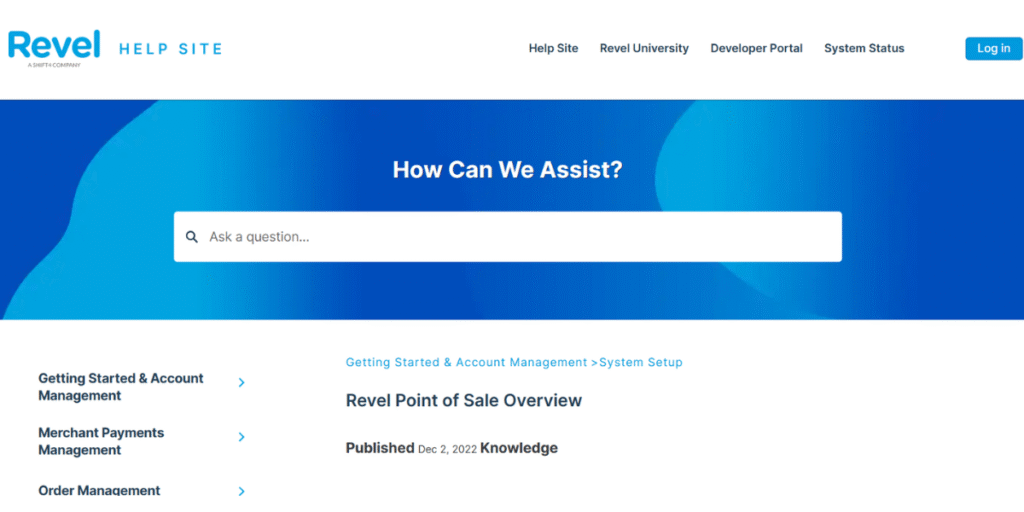
Revel systems are iPad-based POS, that target restaurants, retail stores, and quick-service businesses. It uses cloud flexibility in conjunction with advanced functionality such as employee scheduling, delivery, CRM, and reporting. Revel is very customizable and, therefore, good for businesses that have complicated and demanding needs or that have many locations. It is strong, professional and involves greater investment as compared to entry-level systems.
Pros:
- Popular and reliable in the restaurant business.
- Robust backing of table and order management.An offline mode that can be trusted in terms of continual service.
- Flexible and adjustable to small restaurants and large chain restaurants.
Cons:
- Lack of a modern interface as compared to modern POS tools.
- Has high set up and continued maintenance costs.
Pricing: Plans start at $99/month.
Ideal business type: Ideal for restaurants, bars, and large retailers.
Website: https://support.revelsystems.com/
8. Oracle MICROS
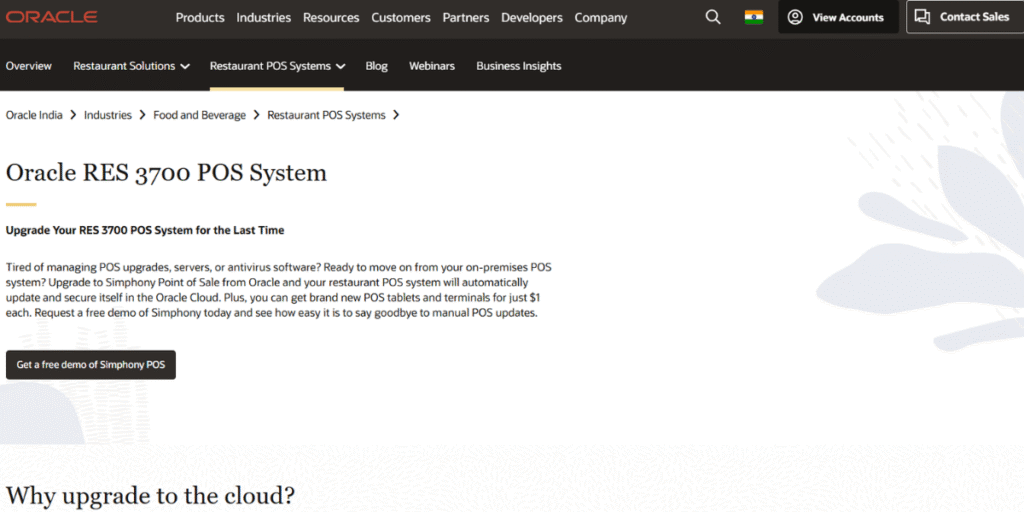
Oracle MICROS is a mature enterprise process-based POS solution, and it is popular in the hospitality industry, restaurant and retail. It provides robust capabilities for large-scale operations such as inventory control, employee management, customer analytics and can be globally scaled. Compared with similar products, MICROS is reliable, highly secure and includes capabilities to scale to enterprise-level business. It fits best in chain stores, hotels, and businesses that require an industrial quality of POS.
Pros:
- Clear, interchange-plus price model.
- Excellent customer service and simple installation.
- Strong global reach and integrations.
- Highly customizable for large businesses.
Cons:
- Very expensive for small businesses.
- Complex setup requiring technical support.
Pricing: Custom pricing available
Ideal business type: Best for hotels, enterprise restaurants, and global retailers.
Website: https://mte4-ohra-idm.oracleindustry.com/oidc-ui/
9. Zoho POS
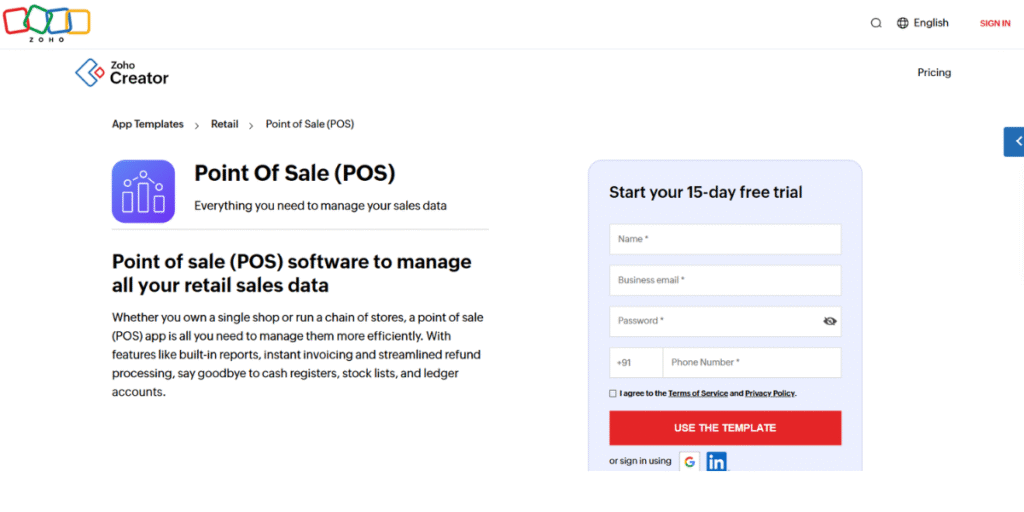
Zoho POS is a product of the Zoho Ecology, targeted to small and medium enterprises that seek a cost-efficient, cloud-based POS solution. It is fully compatible with other Zoho applications, such as CRM, Inventory and Books and is an excellent option in businesses already leveraging the Zoho suite. The system covers billing, inventory, and customer management with a user-friendly design. It’s a cost-effective solution for startups and small retailers.
Pros:
- Affordable and cheap.
- Smooth is connected to the Zoho system (CRM, Books, Inventory).
- Easy and convenient interface.
- Perfect to start up a business and for small enterprises.
Cons:
- Does not have the high-end capabilities of larger businesses.
- Reduced flexibility and expansion.
Pricing: Plans start at $20/month.
Ideal business type: Ideal for small retail stores, cafes, and startups.
Website: https://www.zoho.com/
10. Aloha POS
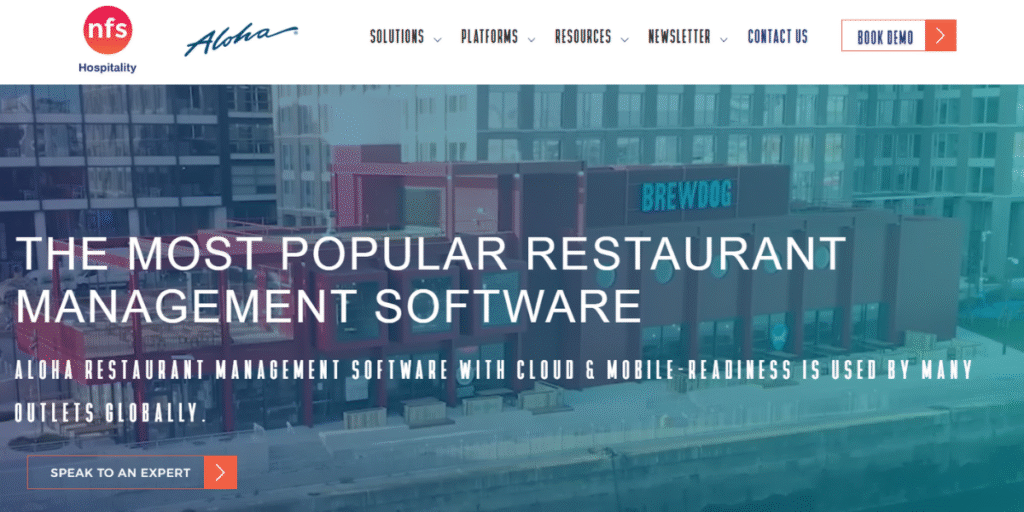
Aloha POS is created by NCR and operates more commonly in cafes, quick-service restaurants, and fine-dining restaurants. It majors in order management, table service, and the routing and scheduling of staff. Aloha has been around in the hospitality industry for decades, of experience in providing stable and user-friendly systems in busy food-service setups. It is reliable, and most restaurants use it all over the world.
Pros:
- Very popular and with credibility in the restaurant market.
- Powerful table and order management.
- Good offline functionality to work at any time.
- Expandable to small restaurant diners up to large restaurants chain.
Cons:
- Well outdated interface relative to modern POS tools.
- High set up and maintenance costs required.
Pricing: Custom pricing based on business size.
Ideal business type: Best for quick-service and full-service restaurants.
Website: https://www.ncrvoyix.com
11. Helcim
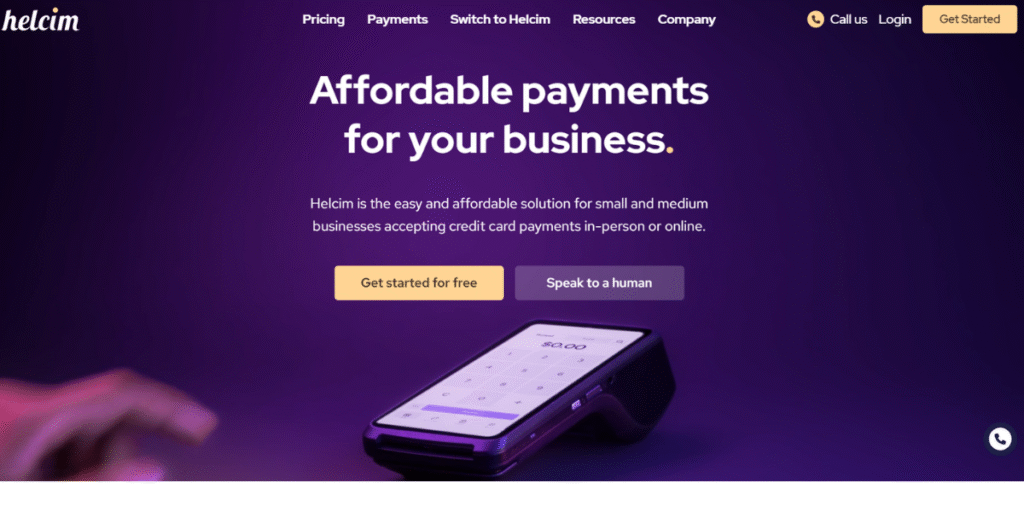
Helcim is a POS and payment processor designed around merchants, especially those who previously did not have it so easy with monthly fees and hidden fees. It provides POS services as well as invoicing, recurring billsillsd customer management. Manufactured to be affordable, Helcim will appeal to small companies that do not want hidden fees. It is a sturdy value with the necessary POS functionality for retail and services.
Pros:
- Interchange-plus with a transparent pricing model.
- Super customer support, simple set-up.
- Does pay-setting, subscription, and online-payment.
- There are no hidden costs or extended obligations.
Cons:
- Does not suit very small businesses with low sales volume.
- Less functionality than top of the line POS.
Pricing: Plans start at $20/month.
Ideal business type: Ideal for small retail businesses, service providers, and mobile vendors.
Website: https://www.helcim.com/point-of-sale/
12. GoDaddy POS
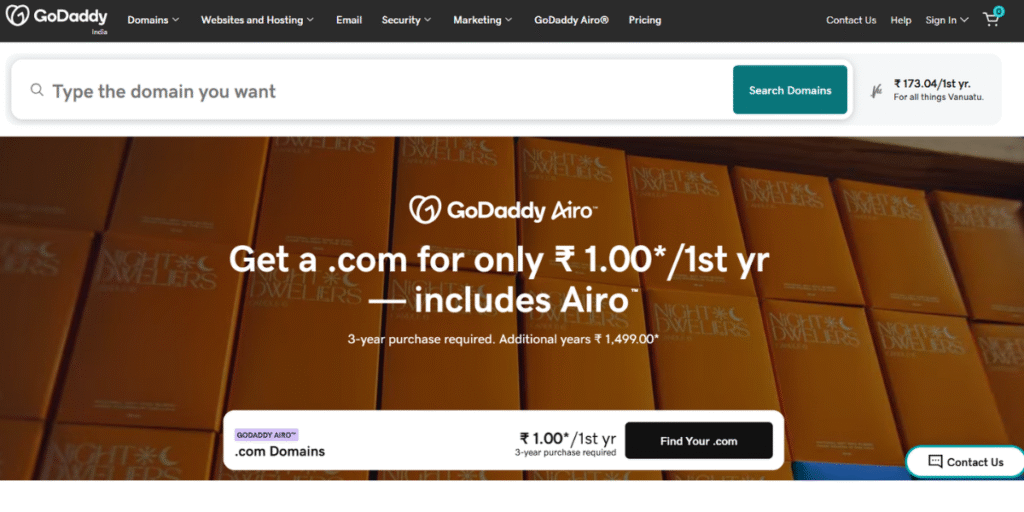
GoDaddy POS is an addition to the existing eCommerce ecosystem of GoDaddy, and hence, it is convenient to use as an online seller to sell in person. It is connected to GoDaddy websites and online stores and synchronises products and inventory. Starter-level, simple to configure, it is positioned at independent merchants and small stores that seek a quick, low-cost POS that is integrated into their GoDaddy ecosystem. At the same time, many users also explore GoDaddy Alternatives for Domain Registration to compare services and choose the best option for their online business needs.
Pros:
- Smooth compatibility with GoDaddy sites and commerce.
- Extremely cheap and entry level friendly.
- Simple to configure by small business and solopreneurs.
- Performs efficiently in both the web and physical sales.
Cons:
- Reduced flexibility and expansion.
- Less advanced reporting and management software.
Pricing: Plans start at $9.99/month.
Ideal business type: Best for small retailers and online-first businesses.
Website: https://www.godaddy.com/en-in
13. TouchBistro
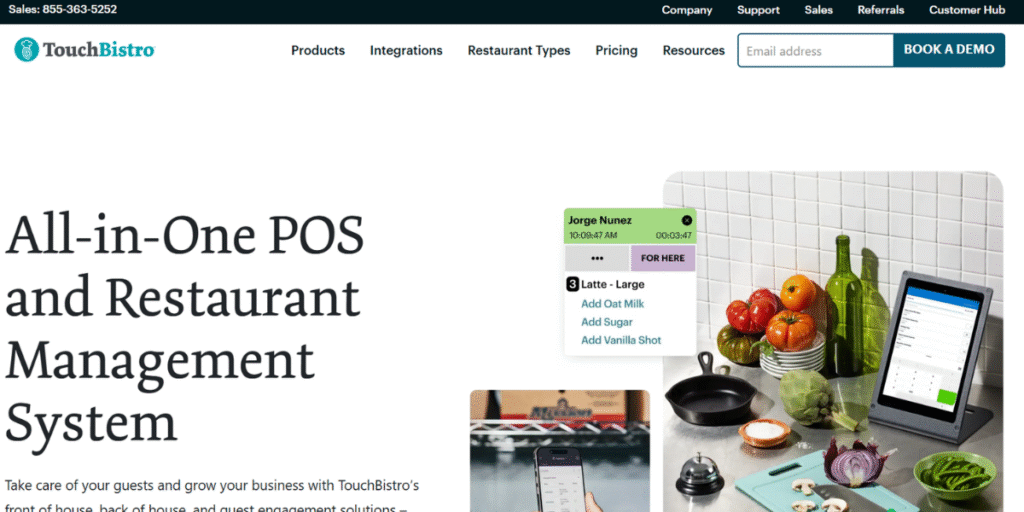
TouchBistro is an iPad-based point of sale system customised for restaurants, cafes, and bars. It is famous due to its simple interface and powerful tools that assist a restaurant in managing aspects such as menu customisation options, tableside ordering, and split checks. The system operates both in the offline and the online mode; therefore, everything functions even when the internet is not available. TouchBistro has gained popularity with small- to mid-sized food-service businesses.
Pros:
- Table and menu management based restaurant-specific POS.
- There is uninterrupted operation in the offline mode.
- Good hooks to payment processors.
- Easy to use iPad based system.
Cons:
- Not as suitable to other businesses.
- There are add-ons and integrations that add up to the costs.
Pricing: Plans start at $69/month.
Ideal business type: Best for restaurants, bars, cafes, and food trucks.
Website: https://www.touchbistro.com/
14. SumUp
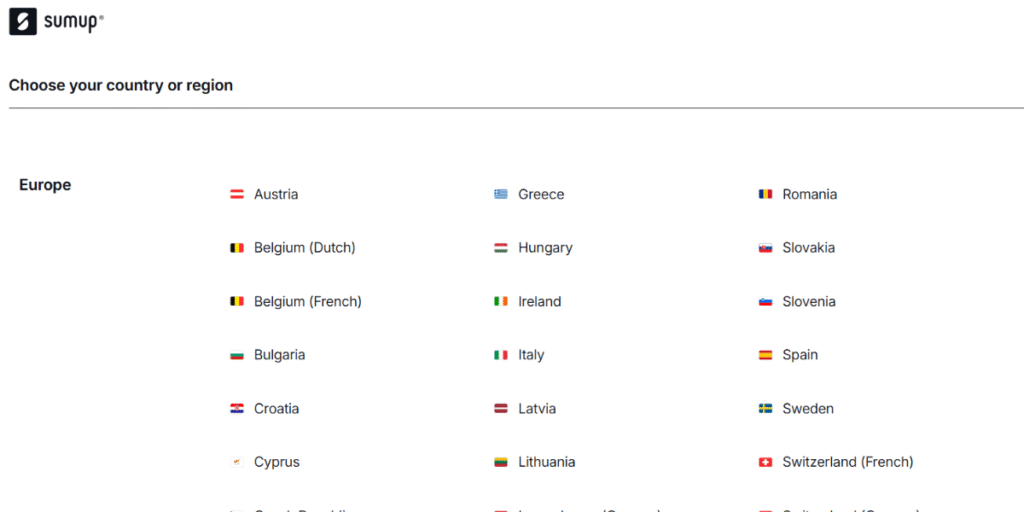
SumUp is a payment and point-of-sale system developed with a mobile-first approach to the needs of small and micro enterprises. With lower setup costs and bottom line fees, it is convenient to accept payments at any time and anywhere using its card readers and mobile app. Although it lays an emphasis on payments rather than on a comprehensive POS solution, SumUp is a perfect choice of freelancers, one-man shops, and businesses that are looking to get a simple method of accepting card payments.
Pros:
- Very cheap and easy pricing.
- Card readers are compact and portable and easy to use.
- Good on the go business such as vendors or pop-ups.
- Suports contact-less and chip payments.
Cons:
- Poor enhanced POS functionality.
- Doesn t scale well to larger businesses.
Pricing: No monthly fees, pay per transaction pricing
Ideal business type: Best for freelancers, solopreneurs, and micro-businesses.
Website: https://www.sumup.com/en-us/
15. ConnectPOS
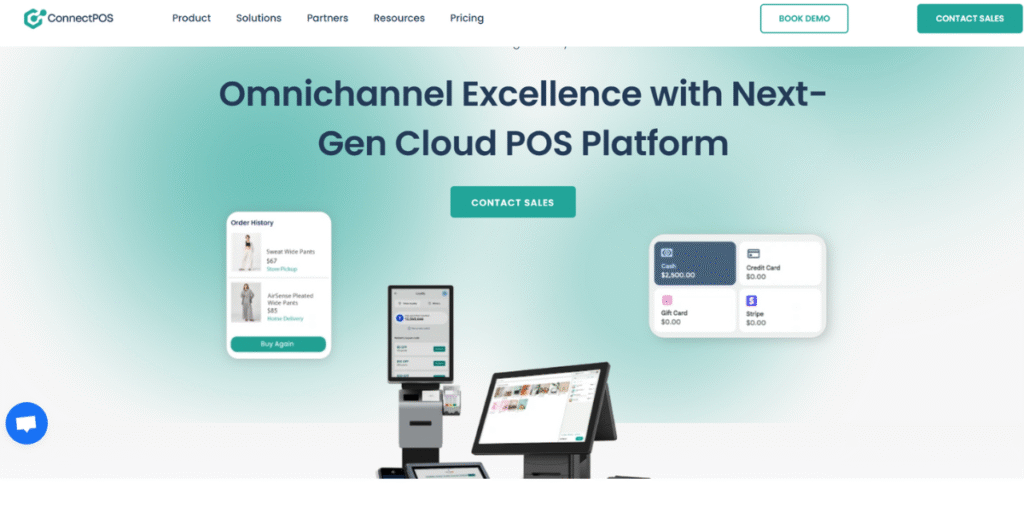
ConnectPOS is a SaaS, cloud-based point of sale system designed to serve retailers with more than one store (or that sell using various channels). It also provides real-time syncing of inventory, personalizable dashboard and compatibility with such platforms as Shopify, Magento, and WooCommerce. ConnectPOS will be particularly useful to retail businesses with its scalability and multi-store functionality, as these businesses seek to integrate all operation efforts under a single system.
Pros:
- Well integrated eCommerce and Omnichannel POS.
- Platform synchronization of inventory in real-time.
- Very flexible features.
- Is cross device and cross operating system.
Cons:
- Needs a little technical know-how to use fully.
- Smallest of businesses can find pricing high.
Pricing: Plans start at $39/month.
Ideal business type: Best for omnichannel and global retailers
Website: https://www.connectpos.com/
How to Choose the Right POS System for Your Business
- Determine your business type: Retail stores, restaurants, cafes, and eCommerce businesses will require different POS functionality. As an example, the benefits of table management are relevant to restaurants (Toast, TouchBistro), and inventory-based tools are useful to retail shops (Lightspeed, Clover).
- Establish a definite budget: POS systems are free to pricey. Some of them are charged every month, some charge a transaction fee, and there are also those with a one-time charge. Select one that is within your budget and not overpay for features you do not use.
- Emphasise user-friendly: A POS must be user-friendly to you and members of staff. Find user-friendly dashboards, mobile responsive and systems that take shorter periods to set up so that there is no delay in the operations.
- Check integrations: When looking at POS, make sure that it can connect with your accounting software or CRM tools, eCommerce platform, or marketing tools. Time saving and fewer manual errors are because to seamless integration.
- Consider scalability: Drive a POS that evolves with your business. As you grow, new functionality, e.g. multi-store, advanced reporting, or loyalty programs, may be necessary.
- Evaluate customer care: Stable customer care could mean the world. Select the providers with 24/7 support, onboarding support, and training.
Future Trends in POS Systems
- Cloud-based solutions: The trend is to have more enterprises shift to cloud POS to have instant access to data, remote control, and automatic updates.
- Intelligent Insights: POS systems are becoming more AI-driven; they process sales data and use it to provide personal offers based on the analysis of the sales pattern and sales prediction.
- Touch & Pay: The increasing use of UPI, digital wallets, tap-to-pay solutions, and PayTm has ensured that POS systems are focusing on mobile and contactless transactions.
- Omnichannel sales: POS systems are integrating in-store, internet and social media retail to provide business enterprises with a single dashboard.
- Self-service kiosks: Kiosks are also spreading to restaurants and retail stores, where they can help to decrease wait time and increase convenience to customers.
- Enhanced security levels: End-to-end encryption, biometric logins, and fraud detection are find their way into POS systems.
Conclusion
The key to selecting the perfect POS system in 2025 is no longer the process of just receiving payments, but rather the revolutionising of the way your business functions. Selling on one end and engaging customers on the other, the POS software of today serves as a complete processing centre of business. It is now possible to obtain tools previously available solely to major companies, and it has become simpler to challenge, expand and provide customers with great experiences in small enterprises.
No matter what kind of stores you own, whether it is a retail store, a cafe, or an online store, investing in a good POS can save time and money, as well as increase efficiency. It is just important to understand what your needs are, compare and find a solution that is not too expensive, that offers the right amount of features and can scale to your bigger needs. Modern tools such as AI Ticketing Systems and smart POS solutions make it easier for businesses to streamline operations while keeping costs in control. Your small business will be positioned better to face the competitive dynamic digital marketplace by adopting the right POS technology.
Frequently Asked Questions (FAQ)
What is the primary function of a POS system?
A POS system assists the business in sales management, tracking the inventory, payment processing and report generation; the overall operations of a business become more streamlined and run even more efficiently.
Are POS systems affordable to small businesses?
Yes. POS providers also have pricing that allows entry level startups and small businesses with its low rates and even free applications in monthly payments.
Do POS systems run without the internet?
The vast majority of the current POS systems are designed in a cloud-based manner, and at the same time, some have offline capabilities for continued transactions in the absence of an internet connection.
What are the best industries that use POS systems?
E-commerce businesses, retail branches, restaurants, cafes, salons, and gyms experience great advantages with the help of POS systems as the processes of sales, payments, and customer management become smooth.
What is the security of POS systems?
New POS systems offer encryption, tokenisation, and fraud detection devices and tools used to guarantee customer data and business data stay secure.
What is the best fit POS system for my business?
The optimal POS varies according to the scale of your business, the industry in which you operate, your budget, and the functionality that you require-inventory tracking, connection, or mobile payments.
